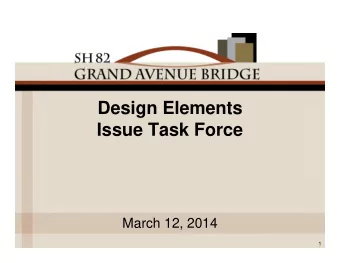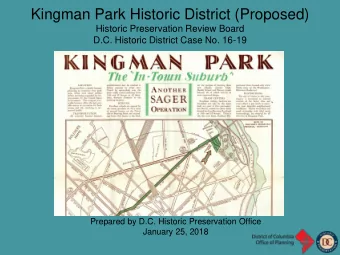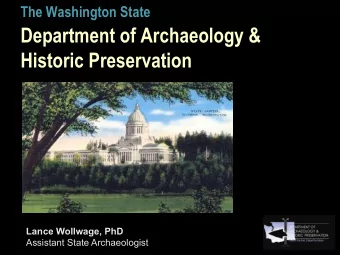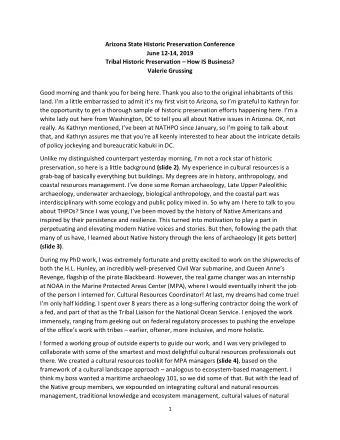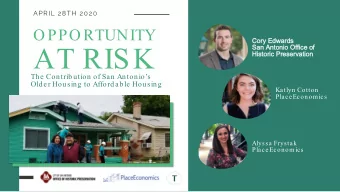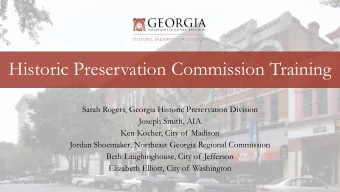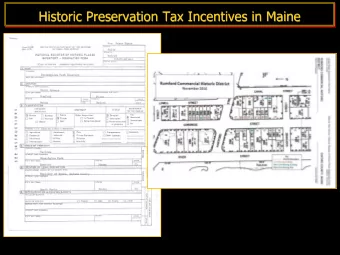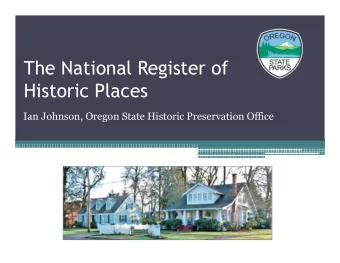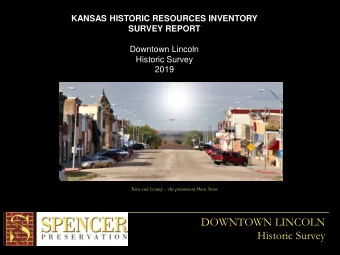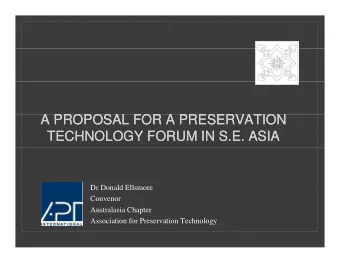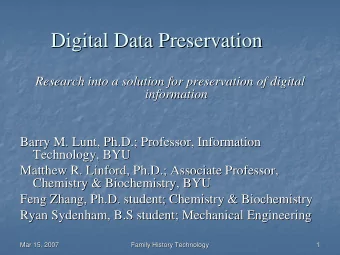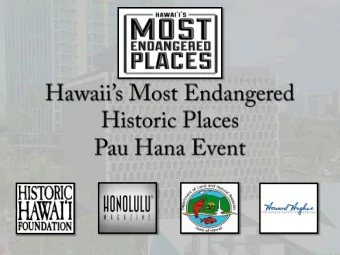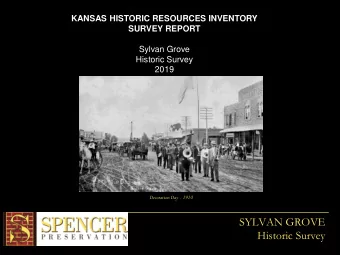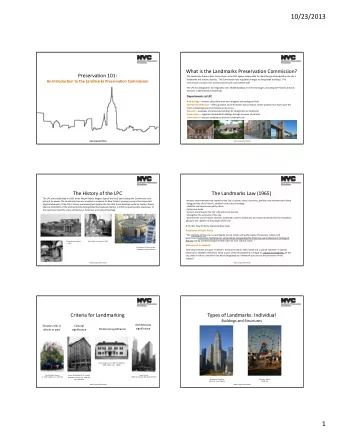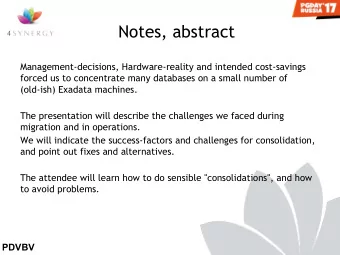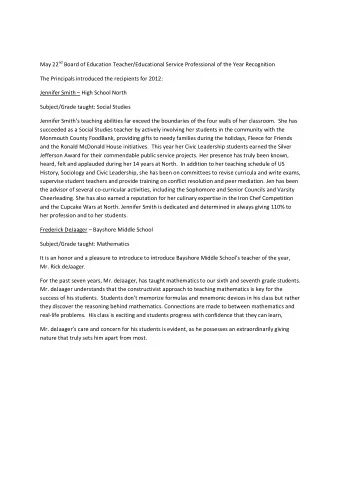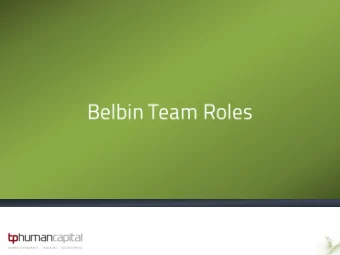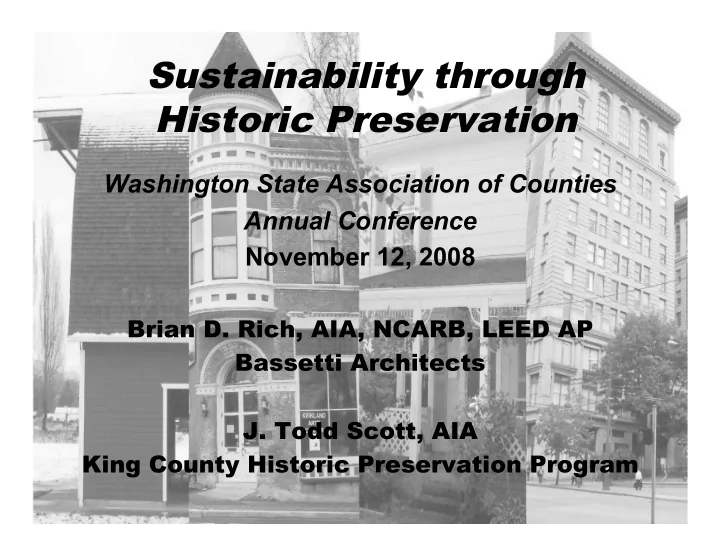
Sustainability through Historic Preservation Washington State - PowerPoint PPT Presentation
Sustainability through Historic Preservation Washington State Association of Counties Annual Conference November 12, 2008 Brian D. Rich, AIA, NCARB, LEED AP Bassetti Architects J. Todd Scott, AIA King County Historic Preservation Program
Sustainability through Historic Preservation Washington State Association of Counties Annual Conference November 12, 2008 Brian D. Rich, AIA, NCARB, LEED AP Bassetti Architects J. Todd Scott, AIA King County Historic Preservation Program
“If you tear that building down, that investment is wasted – but if you keep the building in use, you’re saving energy and conserving resources. That’s what people mean when they call preservation the ultimate recycling.” – Richard Moe, 2007
Purpose of King County Historic Preservation Program Identifying and evaluating historic properties Providing technical assistance Promoting economic development Developing databases for historic & archaeological sites Sustainability Through WSAC Annual Conference Historic Preservation November 12, 2008
Typical historic resources in King County
Large percentage of building stock is landmark eligible Pre-1945 buildings make up 16% 1945-1990 buildings make up 55% Age criteria in King County – 40 years Sustainability Through WSAC Annual Conference Historic Preservation November 12, 2008
The Ultimate in Sustainability Environmental benefits Economic benefits Health and community benefits “Sustainability begins with preservation.” - Whole Building Design Guide
Environmental Benefits Improve air and water quality Reduce solid waste Conserve natural resources Enhance & protect ecosystems & biodiversity “Any new building represents a new impact on the environment.” - Richard Moe, 2007
“I recognize the right and duty of this generation to develop and use the natural resources of our land; but I do not recognize the right to waste them, or to rob, by wasteful use, the generations that come after us.” – Theodore Roosevelt, 1910
Economic Benefits…reduce operating costs Many historic buildings already energy efficient Pre-1920 buildings use 20% less energy than 1980s Vast majority of heat loss is through the roof and walls Encourage attic/wall insulation & window/door weatherization Sustainability Through WSAC Annual Conference Historic Preservation November 12, 2008
Economic benefit…enhances property values Historic districts have more stable property values Historic districts have a greater rate of property value appreciation Sustainability Through WSAC Annual Conference Historic Preservation November 12, 2008
Economic benefit… increases employment For every $1 million in construction cost… • General production plant produces 23.9 jobs • New construction produces 30.6 jobs • Rehabilitation produces 35.4 jobs And many of these are green collar jobs or specialized trades…
Economic Benefits…optimizes life-cycle performance “Considering embodied energy, a new energy-efficient office building doesn’t start saving energy for about 40 years. – Mike Jackson, 2008
Health Benefits…enhances occupant comfort and health Eliminates toxic assemblies, e.g. vinyl windows Individual controllability of ventilation Psychologically healthy environments for living, working and playing Sustainability Through WSAC Annual Conference Historic Preservation November 12, 2008
Community Benefits…reduces need for additional infrastructure Utilizes infrastructure already in place Higher density minimizes cost of infrastructure Sustainability Through WSAC Annual Conference Historic Preservation November 12, 2008
Health & Community Benefits…enhances quality of life Sustainability Through WSAC Annual Conference Historic Preservation November 12, 2008
Health & Community Benefits…Social Sustainability Sustainability Through WSAC Annual Conference Historic Preservation November 12, 2008
Health & Community Benefits…Cultural Sustainability Sustainability Through WSAC Annual Conference Historic Preservation November 12, 2008
Preservation Vision What is the future of preservation in Washington? How do we plan for the future? Sustainability Through WSAC Annual Conference Historic Preservation November 12, 2008
LEED v3 Impact Sustainability Through WSAC Annual Conference Historic Preservation November 12, 2008
LEED v4 Sustainability Through WSAC Annual Conference Historic Preservation November 12, 2008
The greenest building is the one that’s already built. With special thanks to Donovan Rypkema, Place Economics Barbara Campagna, National Trust for Historic Preservation Bassetti Architects
Recommend
More recommend
Explore More Topics
Stay informed with curated content and fresh updates.

